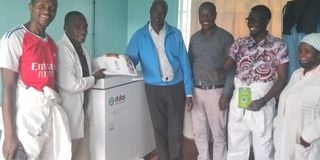Rongai's Ng’ondu dispensary gets solar-powered fridge to boost vaccine storage

Some medical staff with the solar Direct Drive Vaccine Refrigerator Ng’ondu Dispensary in Rongai Sub-County.
A solar-powered vaccine refrigerator has been installed at Ng’ondu Dispensary in Rongai Sub-County, a development that is expected to significantly improve immunisation services in the area.
Installed with support from UNICEF and the Ministry of Health, the Solar Direct Drive Vaccine Refrigerator will enable the facility to safely store vaccines without relying on electricity or fuel-powered generators.
According to the County Biomedical Engineering Officer, Kibet Keitany, the new system guarantees uninterrupted cold chain storage, even in remote or off-grid areas. This ensures that vaccines remain potent and available throughout the year.
“This installation is a game-changer for Ng’ondu and nearby health facilities that have long struggled with power outages. It will help ensure that every child receives timely and effective immunisation," Mr Keitany says.
Nakuru County has made significant progress in strengthening its immunisation network, with the proportion of fully immunised children rising from 83 percent in 2019 to 91 percent in 2021, according to data from the Department of Health.
However, some regions still lag behind the World Health Organization’s target of 95 percent, primarily due to vaccine shortages, staff shortages and limitations in the cold chain.
Health officials say the new solar-powered system will help to bridge these gaps by reducing vaccine spoilage and bringing services closer to families who previously had to travel long distances for immunisation.
This innovation also supports Nakuru County’s ongoing measles, rubella and typhoid vaccination campaign, which aims to immunise around 1.2 million children aged between nine months and 15 years.


